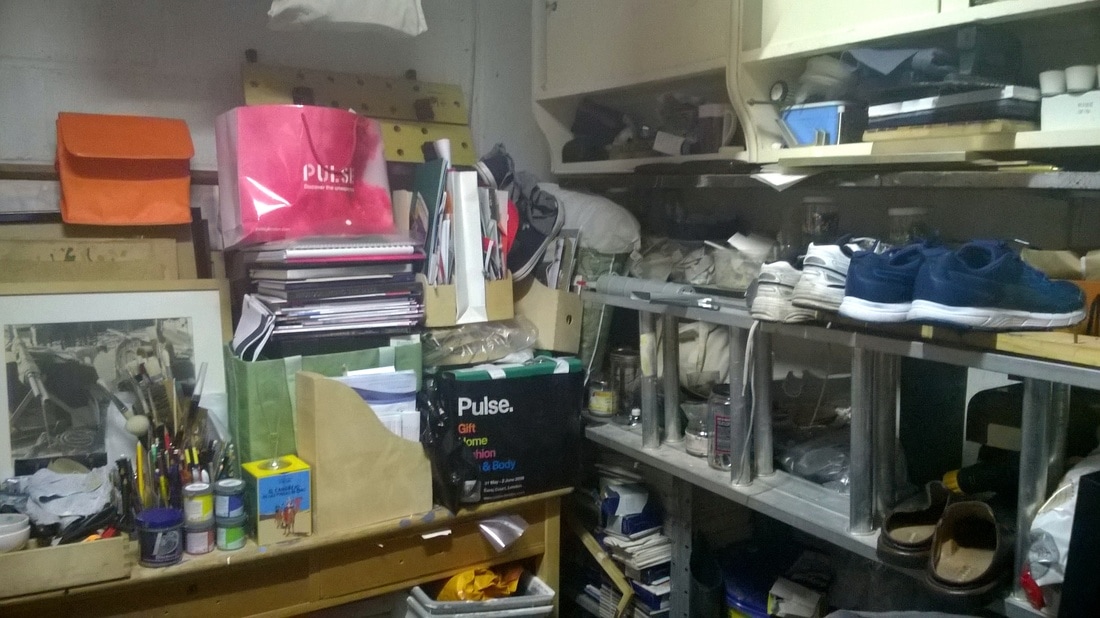The traditional interpretation of the term ‘clutter’ described a thing (Collins Dictionary: “a disordered heap or mass of objects”) rather than a verb (Merriam-Webster: “to fill or cover with scattered or disordered things that impede movement or reduce effectiveness”). This distinction is interesting as it reflects the understanding that we have only started to actively clutter up our space when the word ‘clutter’ already existed to describe a state of affairs rather than an activity. The common theme is “disorder” and “a lot”, but my personal working definition of ‘clutter’ is the following: “anything that is not useful and has not been so for a while”.
While it may sound silly to distinguish between a state of affairs and an action, it is important to understand this, as it reflects how we have to approach clutter to get rid of it. Most people think of clutter in terms of ‘mostly physical objects’, but in fact there is a huge psychological element to clutter! Just think about reasons why you would keep things that you feel (or even know for a fact) are neither useful nor wanted, really. Classic factors include emotional attachment, a vague feeling of obligation, showing off to your peers (‘keeping up with the Joneses’), memories of loved ones, vacation memorabilia, guilt, lack of understanding what is actually there, being overwhelmed by the sheer volume, sense of a collection that needs to be maintained, obsession, … you name it and it could be the reason for a build-up of clutter in the home. And that is without naming the underside of the coin: lazy cleaning spirits, bad personal habits, hoarding (a serious psychological illness!), lack of time/motivation… those are even more dramatic reasons for an accumulation of clutter. In addition to this, most of us are collectors to some degree, and we tend to have a hard time letting go of anything we own. That idea of ownership has a lot to do with prestige – be it real or imagined. Also, there is the financial side to it: we have paid money to acquire something and we do not want to lose money, or appear foolish (if only to ourselves) for having bought something that we do not really need. And not least of all we often attribute emotions to things, because they were given to us by someone we hold dear, or because we associate fond memories with them. All good reasons to keep stuff, right? No: in fact those are really bad reasons. It’s never a good idea to keep stuff just ‘because’. It is taking up space, and it is a constant reminder that there is something left to do or it makes us think of that moment that we made a stupid decision or bought something useless. Clutter obviously affects the mood: just think about something you dislike in your home (just one, please: no need to go overboard just yet) and ask yourself why it is you keep it around! Most likely there is a psychological reason rather than a practical need. Once you understand that, you can tackle the reason behind it and find out if this reason is good enough to make you endure the cringe each time you come across this item. Or maybe, just maybe, you find that you can let go after all. Then move on to the next thing you dislike… So: next time you come across an item in your home that you feel ambiguous about, just repeat this little exercise. Be honest with yourself! If you get even a very weak signal that you might not want to keep this, follow that impression and investigate if you REALLY want to keep this item around. Just in case you have missed my talk at the Southwick Community Health Day in May 2016, here it is:
If you have enjoyed reading this, you may find these other articles interesting:
Comments are closed.
|
Ask the ClutterMeisterIdeas to help clear away the mess in your homes and in your minds.
Feel free to share any of my posts, but please put in a backlink to the original blog post. Thank you. The author
Hi, my name is Tilo Flache. My mission: help clients declutter mind and space.
This blog contains pointers for your journey towards a happier living experience. Archives
November 2023
|




 RSS Feed
RSS Feed




